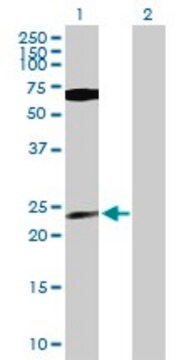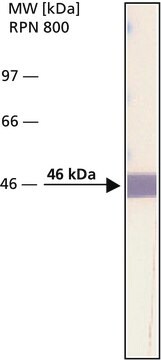P7607
Monoclonal Anti-Protein Phosphatase 1α antibody produced in mouse
clone PPI-377, ascites fluid
Synonyme(s) :
Anti-PP1α
About This Item
Produits recommandés
Source biologique
mouse
Conjugué
unconjugated
Forme d'anticorps
ascites fluid
Type de produit anticorps
primary antibodies
Clone
PPI-377, monoclonal
Poids mol.
antigen 37.5 kDa
Contient
15 mM sodium azide
Espèces réactives
rabbit, rat, bovine, human, mouse, monkey
Technique(s)
immunocytochemistry: suitable
microarray: suitable
western blot: 1:500 using mouse fibroblasts cell extract
Isotype
IgG2b
Numéro d'accès UniProt
Conditions d'expédition
dry ice
Température de stockage
−20°C
Modification post-traductionnelle de la cible
unmodified
Informations sur le gène
human ... PPP1CA(5499)
mouse ... Ppp1ca(19045)
rat ... Ppp1ca(24668)
Description générale
Monoclonal Anti-Protein Phosphatase 1α specifically recognizes an epitope within the catalytic subunit of PP1α isoform (37.5 kDa).
Spécificité
Immunogène
Application
Western Blotting (1 paper)
Clause de non-responsabilité
Vous ne trouvez pas le bon produit ?
Essayez notre Outil de sélection de produits.
Code de la classe de stockage
10 - Combustible liquids
Classe de danger pour l'eau (WGK)
nwg
Point d'éclair (°F)
Not applicable
Point d'éclair (°C)
Not applicable
Certificats d'analyse (COA)
Recherchez un Certificats d'analyse (COA) en saisissant le numéro de lot du produit. Les numéros de lot figurent sur l'étiquette du produit après les mots "Lot" ou "Batch".
Déjà en possession de ce produit ?
Retrouvez la documentation relative aux produits que vous avez récemment achetés dans la Bibliothèque de documents.
Notre équipe de scientifiques dispose d'une expérience dans tous les secteurs de la recherche, notamment en sciences de la vie, science des matériaux, synthèse chimique, chromatographie, analyse et dans de nombreux autres domaines..
Contacter notre Service technique





